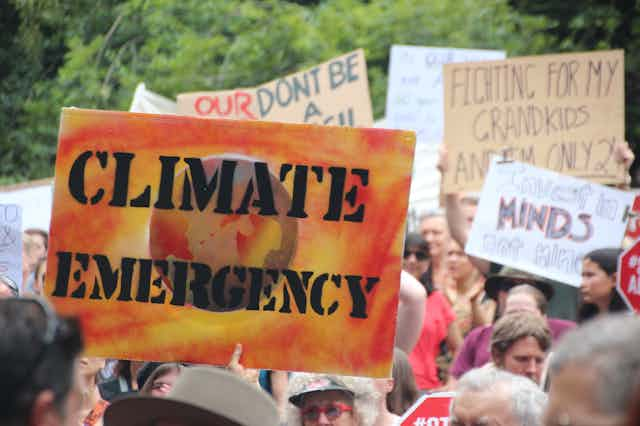What exactly are the nature of the changes needed to address the climate emergency, and who is responsible for making it happen?
An emergency is a situation where we need to act fast in order to prevent catastrophic consequences – like rushing to stop a child running in front of a bus, mobilising fire fighters to put out a forest fire, or intercepting a lorry smuggling explosives for a planned attack. Most would agree these are all examples of emergencies, but the timescales for action are different: seconds for the child, hours for the fire, and perhaps days or even months for the lorry. So while emergencies demand urgent, coordinated and effective responses, the exact timescale depends on the nature of emergency.
The weather can change from moment to moment, but climate is long term concept. It takes years for us even to collect enough data to notice that the climate is changing. Here, the emergency moves in years, not minutes. And the problem with things that change over many years is that there is always something else that appears to need more urgent attention.
For most of the last 30 years we have known that we need to do something about climate change, but other things have been perceived to be more important, and so it has been repeatedly pushed to the back of the queue. After all, the impact of climate change won’t hit until 2050 or 2100, and that is just too far away to worry about – isn’t it? In fact, most people on this planet will still be alive in 2050, when life for many of us is projected to be looking pretty uncomfortable. And greenhouse gases linger in the atmosphere so long that our children will still be living with the environmental consequences of our carbon emissions of 2019 in 2100. So who should act?
It’s easy to say that governments should do something – and perhaps they should. But the reality is that politicians generally do the things that they believe we want. So if we think it’s the job of government to sort this mess out, we should be telling our politicians just that. We should be urging them to think long term not short term, and not to oppose measures like fuel duty escalators (a rising tax on fossil fuels to encourage alternatives) and carbon taxes (a tax on burning fossil fuels as a way of pricing in the environmental damage they cause) just because they will hurt in the short term.

Radical measures required
It’s going to take some pretty radical measures to wean us off our addiction to energy and the carbon emissions energy generation creates. Governments essentially have two main options: to reduce consumption by banning things, or by making them expensive so we use less. Of course, governments can also invest in new technology and new initiatives, but that is a longer term solution and doesn’t really help address the need for urgent action now. If we want governments to do this, we must tell them so, and be prepared for the consequences.
I Need To Know is a series by The Conversation, which gives teenagers the chance to have their questions about the world answered by experts. Send your questions – along with your first name, age and the area where you live – to ineedtoknow@theconversation.com, or find out more ways to get in touch at the end of this article.
You could of course argue that governments don’t generally run the most polluting industries such as power stations, cement works and factories. Industrialists are often pointed to as the real villains. But, again, they’re really just making the furniture, clothing, toiletries and luxury goods that we demand, or that they think we’ll want. It is consumption that drives markets, at home or abroad. If there was no demand for the colossal quantity of stuff that we consume every year, they would stop making it.
Some people argue that their consumption is small compared to others (the average Briton has a much lower carbon footprint than the average American, for example). But that becomes a playground game – “I’m not going to decarbonise if you’re not going to decarbonise” – where we all want our share of the right to pollute. The reality is that our allowance of the cumulative emissions our planet, individually and as developed societies in the west, can withstand have already been used up. It is long past the time that we should create and consume less: less meat, less petrol, less disposable nappies, toys, mobile phones, clothing, furniture – less everything.
But what will we use in the future? That’s where researchers, scientists and engineers come in. In thousands of universities worldwide there are scientists working on how to manufacture new materials, engineers devising technologies that do more with less, and social scientists making sure that the changes being proposed actually make sense in respect of people’s lives in the real world. For example, ensuring low-carbon heating systems deliver the heating needed in older, draughty homes.
By bringing together the work of industry, policymakers, scientists and engineers, we can support the transition to a sustainable lifestyle where we consume less stuff, emit less carbon, and start becoming part of the solution – not the problem.
So, who needs to act? Everyone does. Governments, industry and us. We can be part of the solution by taking action in our own lives, by telling our politicians that we want them to act (even though we know it might make life hard), and perhaps even by working in scientific research or industrial engineering. Ultimately, the planet is on a kamikaze pathway that is being driven by us, and we all have a responsibility to do what we can to help pull it back onto a different track.

